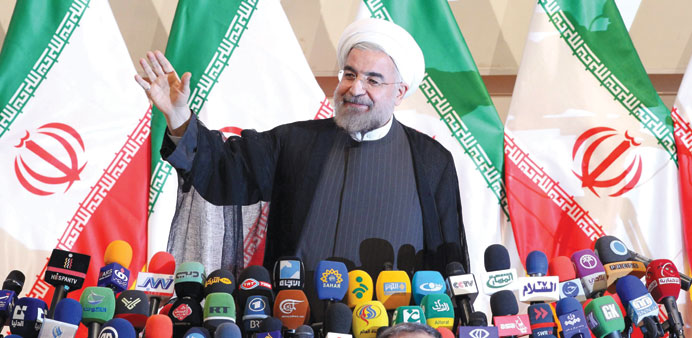AFP/Tehran
Iran’s newly-elected president Hassan Rohani ruled out yesterday any halt to the nuclear activity that has drawn UN sanctions but said he hoped an early deal could be reached to allay the concerns of major powers.
The moderate cleric, who won outright victory in Friday’s presidential election on the hopes of millions for an end to the economic hardship caused by Western sanctions, pledged greater transparency in the long-running talks.
Rohani, addressing his first press conference since winning the vote, said there would be no change in Iran’s long-standing alliance with Syrian President Bashar al-Assad that has been the source of additional Western concern.
But he said he would seek to thaw relations with the key Gulf Arab backers of the rebels fighting to oust Assad’s regime for more than two years.
Rohani, who led the nuclear negotiating team under reformist former president Mohamed Khatami from 2003-5, said there could be no return to the moratorium on uranium enrichment that Iran accepted at the time.
The 64-year-old Rohani said that the EU and US sanctions against Iran’s oil and banking sectors that have sent the economy into free fall were unjust but promised transparent talks to try to resolve the underlying issues.
Iran will be “more transparent to show that its activities fall within the framework of international rules”, he said.
“The idea is to engage in more active negotiations.”
Rohani has repeatedly promised to restore diplomatic relations with the US, broken off more than three decades ago after the storming of the US embassy in Tehran by Islamist students.
He has also expressed readiness for bilateral talks with Washington to allay its concerns that Tehran’s nuclear programme is cover for a drive for a weapons capability.
But he said those talks could not be without conditions.
“The US should not interfere in our internal affairs, recognise the rights of Iran including nuclear rights and stop its unilateral policies and pressure,” he said.
“The next government will not give up the legitimate rights of the country.”
Rohani said he would seek to mend difficult relations between Iran and Gulf Arab states, which have been further strained by the two-year conflict in Syria.
“The priority of my government is to strengthen relations with neighbours... the countries of the Gulf and Arab ones that are of strategic importance and our brothers,” he said.
“Saudi Arabia is a brother and neighbour... with which we have historic, cultural and geographical relations.”
But he said there would be no let-up in Iran’s support for its long-standing ally, Syrian President Bashar al-Assad, to appease Gulf states that back the rebels.
“The government must be respected by other countries until the next elections and then it is up to the people to decide,” Rohani said, referring to Assad’s term of office which does not expire until 2014.
Rohani won Friday’s election with more than 50% of the vote against a divided field of hardline conservatives. Page 28

Rohani waves to the media during the press conference in Tehran yesterday.
